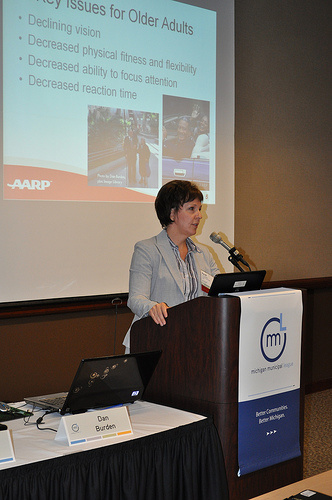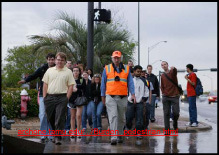You are currently browsing the tag archive for the ‘Walkability’ tag.
Interested in making your neighborhood or community more conducive to walking? The Michigan Department of Transportation (MDOT) is promoting a series of “walkability” audits in seven communities around the state, designed to provide a hands-on evaluation of the walking conditions in a portion of the community, and a discussion of design improvement ideas.
The walkability audits are designed to help city engineers, planners, officials, residents and others realize the benefits of providing a safe and attractive environment for walking. The free audits will be conducted by Dan Burden of the Walkable and Livable Communities Institute, who has 40 years of experience in developing, promoting and evaluating active transportation facilities, traffic calming practices and sustainable community design.
Audits will be conducted from Aug. 12 to17. For more details, contact the community organizer.
The 2012 schedule follows:
Sunday, Aug. 12 - Paw Paw
[email protected]
Monday, Aug. 13 - Alpine Township
[email protected]
Monday, Aug. 13 - Wyoming
[email protected]
Tuesday, Aug. 14 - Meridian Township
[email protected]
Wednesday, Aug. 15 - Gaylord
[email protected]
Thursday, Aug. 16 - Trenton
[email protected]
Friday, Aug. 17 - Detroit
[email protected]
According to Walk Score, the 65 largest cities in Michigan have an average Walk Score of 46. The most walkable cities in Michigan are Hamtramck, Ferndale, and Madison Heights. The least walkable cities are Forest Hills, Allendale, and Norton Shores.
| City | Walk Score | Population |
|---|---|---|
| Hamtramck | 69.7656 | 22,176 |
| Ferndale | 64.8001 | 19,634 |
| Madison Heights | 63.8249 | 29,542 |
| Mount Pleasant | 61.7884 | 25,985 |
| Birmingham | 60.3946 | 19,956 |
| Ann Arbor | 59.8564 | 112,674 |
| Bay City | 59.8069 | 34,788 |
| Ypsilanti | 59.6608 | 19,317 |
| Eastpointe | 59.5506 | 32,484 |
| Royal Oak | 59.132 | 57,334 |
| Southgate | 57.5833 | 29,800 |
| Dearborn | 57.5231 | 98,142 |
| East Lansing | 57.2831 | 48,669 |
| Jackson | 56.704 | 33,572 |
| Oak Park | 55.9012 | 29,365 |
| Adrian | 55.3049 | 20,923 |
| Marquette | 55.1753 | 21,324 |
| Monroe | 54.7585 | 20,458 |
| Lincoln Park | 54.5449 | 38,099 |
| Grand Rapids | 54.3065 | 187,794 |
| Roseville | 53.4824 | 47,145 |
| Allen Park | 53.3304 | 28,569 |
| Wayne | 52.6947 | 17,554 |
| Holland | 52.0349 | 32,945 |
| Kalamazoo | 51.1594 | 74,080 |
| Detroit | 50.9319 | 713,110 |
| Garden City | 50.6911 | 27,849 |
| Trenton | 50.5172 | 18,701 |
| Wyandotte | 50.3316 | 25,943 |
| Dearborn Heights | 49.9835 | 57,685 |
| Flint | 49.5444 | 102,376 |
| Warren | 49.2412 | 133,954 |
| Muskegon | 48.8662 | 38,065 |
| St. Clair Shores | 48.828 | 59,743 |
| Lansing | 48.691 | 113,877 |
| Livonia | 45.9098 | 96,933 |
| Pontiac | 45.4796 | 59,467 |
| Saginaw | 45.4681 | 51,089 |
| Southfield | 45.3944 | 71,893 |
| Westland | 45.2097 | 83,959 |
| Wyoming | 44.256 | 72,139 |
| Waverly | 41.3952 | 23,722 |
| Taylor | 40.9896 | 62,830 |
| Sterling Heights | 40.9298 | 129,782 |
| Battle Creek | 40.7205 | 52,203 |
| Inkster | 40.6972 | 25,279 |
| Troy | 38.1339 | 81,305 |
| Midland | 37.3351 | 41,743 |
| Auburn Hills | 36.0071 | 21,338 |
| Okemos | 35.174 | 21,415 |
| Port Huron | 34.3328 | 30,059 |
| Farmington Hills | 34.2541 | 79,857 |
| Walker | 33.351 | 23,572 |
| Kentwood | 33.27 | 48,544 |
| Burton | 32.4158 | 30,096 |
| Rochester Hills | 31.9219 | 70,951 |
| Novi | 31.0852 | 55,095 |
| Portage | 29.9784 | 46,139 |
| Haslett | 29.504 | 19,139 |
| Jenison | 29.2745 | 16,501 |
| Holt | 29.1518 | 23,920 |
| Romulus | 25.2301 | 23,916 |
| Norton Shores | 24.1968 | 24,052 |
| Allendale | 22.6448 | 17,555 |
| Forest Hills | 16.4751 | 25,847 |

Michigan Complete Streets Coalition partner Karen Kafantaris of AARP presents on Complete Streets at the Michigan Municipal League's 2010 Capitol Conference held April 13 -14 in Lansing.
A packed room of 100+ engineers, planners and politicians attended the Complete Streets workshop at the Michigan Municipal League’s 2010 Capitol Conference held April 13 -14, 2010 in Lansing.
The panel included John Switalski (D - Warren) who spoke on pending statewide Complete Streets legislation that he plans to introduce this spring. Nationally recognized walkability expert Dan Burden also joined the discussion, as did Lansing City Council Women Jessica Yorko who recounted Lansing’s recent citizen driven Complete Streets initiative which led to the adoption of the first Complete Streets ordinance in Michigan. Michigan Complete Streets Coalition partner Karen Kafantaris of AARP rounded out the panel as she made the case for why Complete Streets are essential to mobility needs of aging Americans.
 Just posting a friendly reminder as a follow-up on our post from last week regarding tomorrow’s Virtual Lobby Day in support of the Active Community Transportation Act, H.R.4722. Tomorrow the League of Michigan Bicyclists is leading a delegation of 13 Michigan cycling advocates to lobby for Complete Streets and more funding and federal support for bicycling in Michigan. We have a full day of meetings scheduled with Michigan Congresspeople and are asking you to back up our face to face efforts with phone calls from back home. Specifically, please help us generate support for H.R. 4722 (Act Act).
Just posting a friendly reminder as a follow-up on our post from last week regarding tomorrow’s Virtual Lobby Day in support of the Active Community Transportation Act, H.R.4722. Tomorrow the League of Michigan Bicyclists is leading a delegation of 13 Michigan cycling advocates to lobby for Complete Streets and more funding and federal support for bicycling in Michigan. We have a full day of meetings scheduled with Michigan Congresspeople and are asking you to back up our face to face efforts with phone calls from back home. Specifically, please help us generate support for H.R. 4722 (Act Act).
Learn more about the ACT Act here.
Download Issue Paper on ACT Act (and Complete Streets Bill) here.
TAKE ACTION
For those Michigan complete streets advocates not attending the National Bike Summit in Washington, DC, please participate in the Virtual Lobby Day on Thursday March 11. In conjunction with the National Bike Summit we ask that you call your representative at the same time that over 700 Summit participants will have in-person meetings in congressional offices. The combination of face to face and phone communications in support of this bill will demonstrate a strong and unified Michigan voice next week on Capitol Hill. The Virtual Lobby Day is being organized by our cycling friends at America Bikes.
We encourage you to use the talking points below to send your own alert encouraging your members to participate.
TALKING POINTS
Please call your representatives on March 11th to ask them to co-sponsor H.R.4722: “The Active Community Transportation Act.” Tell them:
- Bicycling and walking are part of the solution. Half of all trips in the United States are three miles or less, yet the majority of these short trips are made by car. Shifting more of these short trips to biking and walking would not only reduce congestion, air pollution, greenhouse gas emissions, and our dependence on oil, but will also improve physical activity, safety, and livability.
- Investing in bicycling and walking infrastructure works. Commuting by bicycle has increased 43 percent since 2000 - and by 69 percent in designated Bicycle Friendly Communities that have invested in infrastructure improvements.
- Please co-sponsor the Active Community Transportation Act (H.R.4722).
Here are the phone numbers for all the Michigan Congress people:
- Senator Carl Levin (D- MI) 202-224-6221
- Senator Debbie Stabenow (D- MI) 202-224-4822
- Representative Bart Stupak (D - 01) 202-225-4735
- Representative Pete Hoekstra (R - 02) 202-225-4401
- Representative Vern Ehlers (R - 03) 202-225-3831
- Representative Dave Camp (R - 04) 202-225-3561
- Representative Dale E. Kildee (D - 05) 202-225-3611
- Representative Fred Upton (R - 06) 202-225-3761
- Representative Mark Schauer (D - 07) 202-225-6276
- Representative Mike Rogers (R - 08) 202-225-4872
- Representative Gary Peters (D - 09) 202-225-5802
- Representative Candice Miller (R - 10) 202-225-2106
- Representative Thaddeus McCotter (R - 11) 202-225-8171
- Representative Sandy Levin (D - 12) 202-225-4961
- Representative Carolyn Kilpatrick (D - 13) 202-225-2261
- Representative John Conyers, Jr. (D - 14) 202-225-5126
- Representative John D. Dingell (D - 15) 202-225-4071
Don’t know who your Congressperson is? Visit http://capwiz.com/lab/home/ and enter your address to find out.
Dan Burden, an international expert on walkability, will lead a workshop on how physical design and walkability are at the core of creating and sustaining 21st century communities. See firsthand why Time Magazine listed him as one of the six most important Civic Innovators in the World. Participants will walk away with an expanded tool kit to draw from to build healthier neighborhoods and more complete streets through progressive physical design, improved connectivity and better traffic controls. Participants will better understand the impact of transportation and land use patterns on a local community in terms of safety and quality of life, including the effect of physical design on local economies. As part of this session, attendees will set visionary yet achievable goals and identify practical, high-impact changes that can be implemented within their community. Read the rest of this entry »
Yet another Michigan city has recognized the link between infrastructure and livability, and stepped up it’s commitment to safe infrastructure for walking and biking. Yesterday we heard from Traverse City Mayor Chris Bzdok, who wrote to inform us that the City adopted a new infrastructure policy in September — one that includes an emphasis on complete streets. The policy makes an expressed bias in favor of sidewalk and bikeway construction. See more over at http://www.ci.traverse-city.mi.us/Policy/InfrastructureStrategyPolicy.pdf
In addition to this new infrastructure policy, the City will dedicate 10% of its infrastructure budget to sidewalks, bikeways and other people-friendly infrastructure, the highest known percentage commitment of any municipality in the state of Michigan.
Mayor Bzdok’s commitment to these issues is sincere – he can often be seen riding his bicycle to work and to City Hall. Meanwhile, his administration has additional complete streets-related goals for the City, outlined in full at www.planfortc.com.
We could go on about these goals, but this quote says it best:
“[We desire s]treets that serve not only cars, but also bicycles and pedestrians. It means bike lanes, sidewalks, and safe places for people to cross our major roads. It means solving the problems on Division Street. It means re-striping Eighth Street so people can ride their bicycles safely between Boardman and Central neighborhoods. It means installing or improving pedestrian crossings over US-31 at Fourteenth Street, Eleventh Street, Randolph, Grandview Parkway, Oak Street, Hall Street, Garfield, Eighth Street, and Parsons. It means providing safe routes to school.
In part, this is an equity issue. Not everyone has a car, or is in a position to drive. They deserve a way to get around town, too. In part, this is a plan for reducing traffic in our city. If we don’t make it safe and convenient for people to travel on foot or bicycle, how can we ever expect them to get out of their cars? It’s also about being a desirable city. The most sought-after places around the country provide for walking and biking throughout their city limits, and residents and visitors in those cities do just that. It’s time we get with the program.”
Well put, Mayor Bzdok. Thanks for your leadership on these important issues!
Taking a stroll? Ann Arbor is the safest city in Michigan to do it, while Flint is the most dangerous according to a national report released today.
Overall, the number pedestrians killed each year in Michigan is above the national average (12.2% in Michigan, compared with 11.8% nationally). Cities including Lansing, Grand Rapids and Jackson scored favorably, while Detroit, Monroe, and others scored well below the national average. Click here for the complete data on Michigan.
More than 4,500 Americans died last year while walking in the nation’s cities and towns. In Michigan, 253 pedestrian fatalities were recorded in 2007 and 2008.
The report—Dangerous by Design: Solving the Epidemic of Preventable Pedestrian Deaths—was authored by Transportation for America and the Surface Transportation Policy Partnership. It was released in Michigan through the Michigan Environmental Council.
The report shows that communities that invest in safe, complete streets — those that encourage pedestrians, cyclists and motorists to coexist safely — are the safest places to walk. Walk- friendly policies and infrastructure should be a key pillar of policies to encourage revitalization of urban cores throughout the state.
Unfortunately, only a trickle of transportation funding is used to address pedestrian safety. Pedestrian deaths account for 12 percent of all traffic deaths, yet only 1.5 percent of funds available in the current federal transportation bill are directed toward pedestrian safety.
July 6 - 17th, 2009
 Michigan Department of Transportation, in collaboration with Michigan State Housing Development Authority, Michigan Department of Environmental Quality and Michigan Department of Community Health, is pleased to offer the opportunity for you to attend a walkability audit in a Cool City, City of Promise, Port City and/or a Building Healthy Community near you.
Michigan Department of Transportation, in collaboration with Michigan State Housing Development Authority, Michigan Department of Environmental Quality and Michigan Department of Community Health, is pleased to offer the opportunity for you to attend a walkability audit in a Cool City, City of Promise, Port City and/or a Building Healthy Community near you.
Read the rest of this entry »















